Newspaper Genealogy
Newspapers and Genealogy Go Hand in Hand
Everyone I know who’s been doing family history research for any length of time has been utilizing newspapers in their research. Some of the most common and best known information you can find in newspapers include birth announcements, marriage announcements and obituaries. But these are just the tip of the iceburg. You can find so much more about individuals in newspapers. You can learn about events in their lives such as the time my ancestor was badly bitten by a dog as a little girl in the 1870s or you may find out your ancestor was arrested for drunkeness. More about these stories later.
The article below is about my uncle who died when he was just a baby. This was in between census years so he did not show up on any census record.
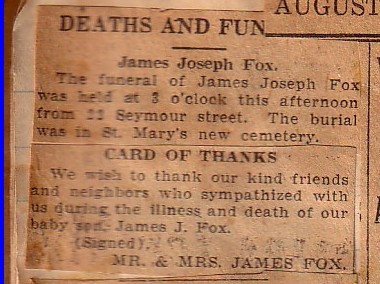
Newspapers have been around in the United States since before the Revolutionary War. A founding father, Benjamin Franklin himself was a newspaper man. In 1732, Benjamin Franklin published “Poor Richard’s Almanac”. Newspapers spread the news of the Boston Tea Party and other events in the Revolutionary War throughout the colonies. During the Civil War, many military items were written about. Even the lowest private can be found in many of these artilcles. Even if your ancestor is not found in the newspapers you can read about the events happening in their local community which undoubtable influenced your ancestors daily life.
More and more newspapers are being digitalized and being put on-line. Some subscription websites such as Genealogy Bank and NewspaperArchive.com
offer a wide range of newspapers on-line. There are also some collections you can use for free. Your local or state library may have subcriptions to digital collections of newspapers and some of these you may be able to access from the comfort of your home with using your own library card.
Unfortunately, there are still more newspapers which have not been digitalized and been put on-line, than those which are on-line. These newspapers can usually be found at local, county and/or state libraries or archives. Local historical societies also have very good collections. You may have to be a detective to find out where old local newspapers from your ancestor’s area ended up. Call around and you’ll be sure to find where they are located.
The following article was from a newspaper clip collection one of my great aunts had and was given to my mother. John Fox was my great uncle and there are several lengthy articles were about him and the accident which took his life.
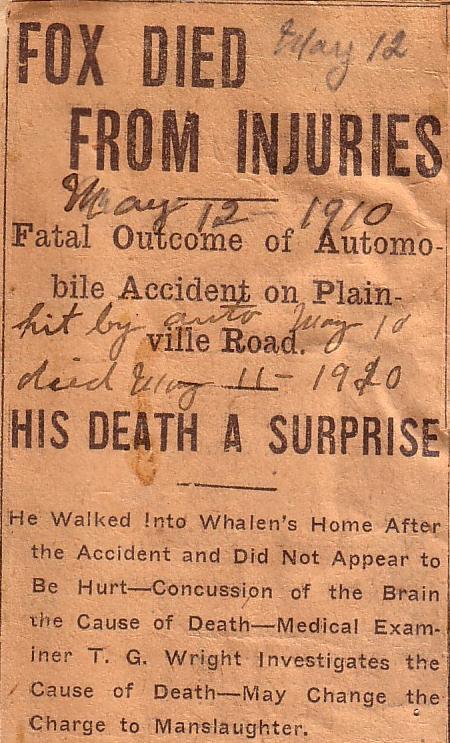
Whether you found a newspaper archive on-line for free or have a paid subscription you’re in luck. These archives generally have an all words index. This means every word in the newspaper article archives have been put into the index. If you’re looking for your ancestor using microfilm of the newspaper at a local library or archive, you’ll have to scroll through the pages looking for your ancestor. For this reason, I usually search for a known event such as a brith, marriage or death. An obituary can occur weeks or months after the death and wills may be mentioned out even farther than that.
When using an on-line newspaper collection, I’ve used a few strategies to find my ancestor. When searching use various spellings of your ancestor’s name. Some newspaper archives let you search by type of article. Some of the categories to search for include birth announcements, marriage announcements and obituaries. You can read all the birth announcements around your ancestor’s expected birth date. You’ll have to look a few weeks after the event as well. Sometimes it took a while for this type of news to make it into the newspaper. If your ancestor was in the military, especially during the Civil War, you can look for the ancestor’s military unit. Even if you don’t find your ancestor, you can learn a lot about the unit he served in and about the battles the unit fought in. My ancestor John D. Laurie fought in the 10th Connecticut infantry. Common search phrases for this could be “tenth connecticut”, “10th connecticut” or “10th C V”. This strategy lead me to an article which reported him as injured and left on the battlefield.
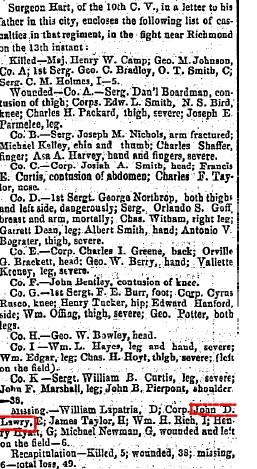
Newspapers can offer amazing images into some events in your ancstors life. Read the short articles below. Where else but in newspaper research would you find out about such events.
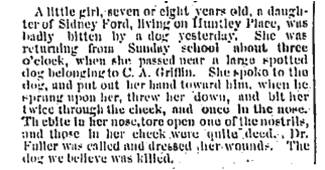
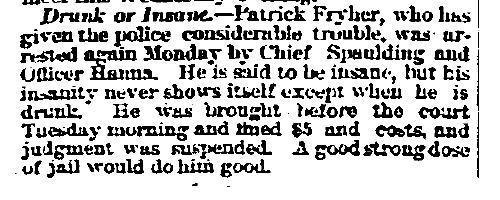
I hope these articles inspire you to look for your ancestors in newspapers. There’s a lot more than just names and dates to your ancestors.

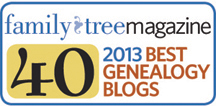

I think old newspapers are not utilized to their full extent in genealogy research. They are a goldmine of information if you take the time to look. One of my favorite sections of the old papers is the society columns. I’ve found numerous mentions of my ancestors and what they were doing each week. Fun stuff! I also wanted to mention, if your local library doesn’t have the microfilm for a certain newspaper, they can usually request an inter-library loan for a small fee. Your local library can keep the microfilm on hold for a week or two so you can review it. Also wanted to mention when looking for marriage & death records to check surrounding counties/cities if you are unable to locate the news in the local paper due to a missing issue. This has happened to me and by checking in another town’s paper I was able to locate my gggrandmother’s obituary.
Newspaper are one of my favorite genealogy sources. I would never have found out about that my ancestor as a little girl was so badly attacked by a dog.
On another note, I’m not sure if you saw this weeks post. I think it was published right around the time you replied to my earlier post. This week I went through a few tips about how to find newspaper archives.
Regards, Jim
I’ve had a couple of my biggest breakthroughs because of legal announcements placed in newspapers. I have the best luck using newspaperarchive.com through my local library’s website. It’s a fabulous resource. I also have had some interesting finds through the database on NEHGS (subscription) – I think it’s called Early American Newspapers.
Thanks for stopping by. I love using newspapers in my research. I’ve found a number of things I would not have been able to find anywhere else.
Regards, Jim